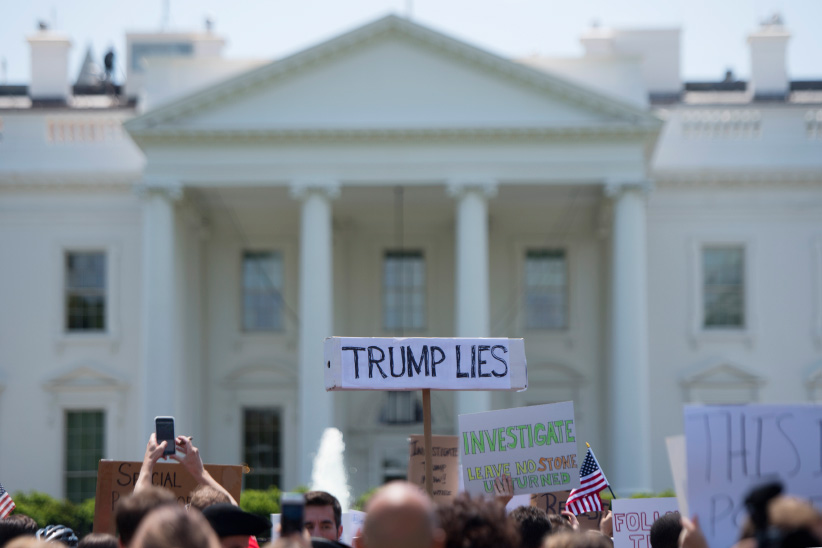What is a special counsel?
The special counsel will independently investigate any ties between Russia and the Trump election campaign, but the position has its limits
A protester holds a placard in front of the White House during a protest demanding an independent investigation in the Trump/Russia ties after the firing of FBI Director James Comey in Washington, DC, May 10, 2017. (Jim Watson/AFP/Getty Images)
Share

Deputy attorney general Rod Rosenstein appointed Robert Mueller to serve as a special counsel for the United States Department of Justice this week, authorizing him to continue the investigation led by former FBI director James Comey into any ties between Russian government officials and individuals associated with the campaign of U.S. President Donald Trump. Calls for such a move intensified after the president, with support from Rosenstein, fired Comey. So what exactly is a special counsel?
The term is used somewhat interchangeably with “special prosecutor,” but the latter is outdated. In 1978, Congress passed the Ethics in Government Act in the wake of the Watergate scandal. Thereafter, a three-judge panel based at the U.S. Court of Appeals in the District of Columbia could appoint an independent prosecutor to investigate matters in which other bodies, such as the DOJ, have a conflict of interest. Probably the most famous (or infamous) such figure is Kenneth Starr, who was initially appointed to lead an inquiry into a real estate deal involving the Clintons, and ended up exposing former U.S. president Bill Clinton’s affair with Monica Lewinsky. Congress did not renew the law in 1999.
Current provisions allow the attorney general (or acting attorney general, in this case) to appoint a special counsel—the favoured terminology today—when there is a conflict of interest or other “extraordinary circumstances,” and when it’s in the public interest to do so. A special counsel is a lawyer from outside the government and has the power to issue subpoenas and bring criminal charges. Indeed, Rosenstein’s order on Mueller’s appointment specifically notes the special counsel “is authorized to prosecute federal crimes arising from the investigation.”
Mueller ultimately answers to Rosenstein (he cannot be fired by Trump) but will operate outside traditional chains of command at the DOJ. He’s not subject to day-to-day supervision, though Rosenstein can request an explanation for any decision or steps that he takes. The DOJ will supply Mueller with staff, and he can request specific individuals, including those from outside the department.
When the investigation wraps up, the findings won’t necessarily be made public. The special counsel prepares a confidential report explaining the decision whether or not to proceed with charges and presents it to the attorney general, who notifies Congress of the conclusion. The attorney general can decide to make the report public.
Some have argued that’s a shortcoming of appointing a special counsel to investigate any Trump-Russia ties. “[It] is entirely possible that there could have been improper or inappropriate contacts between the Trump campaign and Russian intelligence without U.S. law having been broken,” wrote attorney Peter Zeidenberg, who served as an assistant special counsel in the past. That means no indictments, no press conferences, and no public documents. If the special prosecutor were to find evidence of objectionable but otherwise legal behaviour, Zeidenberg wrote, “the public would remain entirely in the dark.”
MORE ABOUT DONALD TRUMP FAQ:
- What is the 25th Amendment, and could it be used against Trump?
- What is a trial in the Senate?
- Who is Rod Rosenstein?
- Who is Robert Mueller?
- How does impeachment work, and could it happen to Donald Trump?
- What will Donald Trump do for the ‘lock her up’ crowd?
- What happens to the lawsuits involving a president?